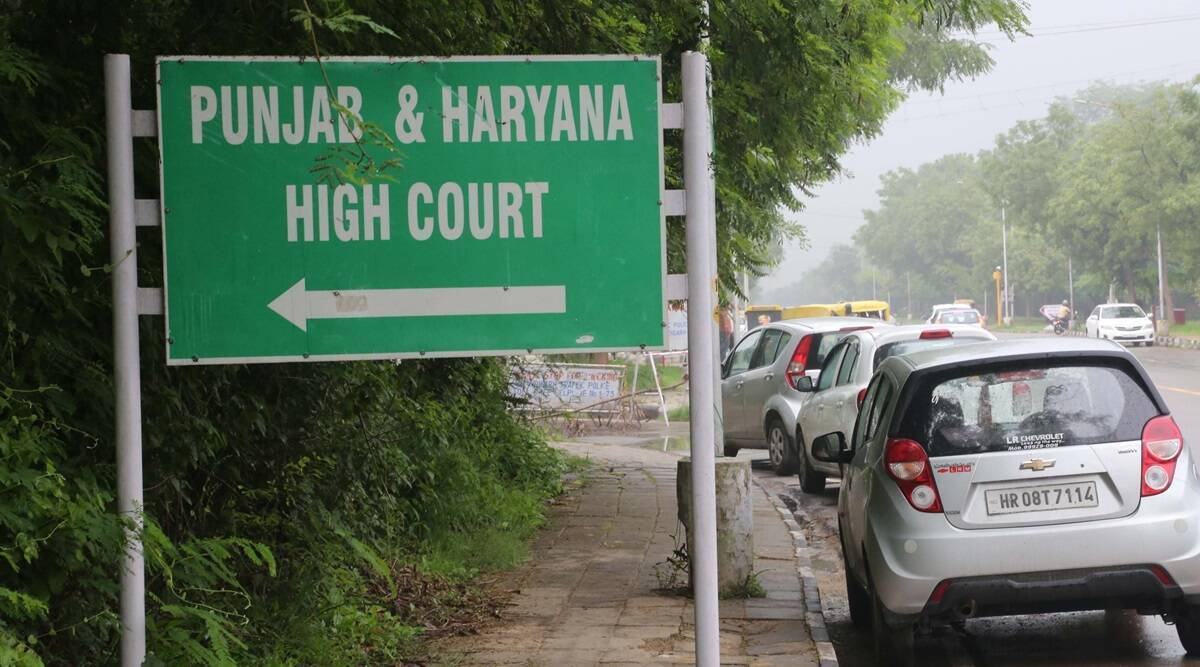 A board of the Punjab and Haryana High Court (Express Photo: Jaipal Singh)
A board of the Punjab and Haryana High Court (Express Photo: Jaipal Singh)
Observing that “prisoners are human beings despite their liberty having been curtailed”, the Punjab and Haryana High Court, while partly allowing the plea of seven gangsters against solitary confinement at Bathinda jail, has held quasi-solitary confinement to be illegal and violative of the rights guaranteed under Article 21 of the Constitution.
The seven gangsters had approached the High Court in March seeking release from solitary confinement after the Punjab Prisons Department ordered the shifting of 41 prisoners, including a number of gangsters, from various jails in the state to Bathinda jail to put them in a proposed “communication dead zone” — where there’s no mobile connectivity.
The petitioners, through counsels R Kartikeya, Saurav Bhatia, Amjad Khan and Adarsh Priyadarshi, contended that they have been denied various amenities that are available to ordinary prisoners such as facility of private maintenance, i.e., provision of food, clothing, bedding and other necessaries through private sources, cooking facilities, adequate food and water, adequate clothing and newspapers, magazines and television. They said they are confined to their cells for 22 hours a day and released only for two hours, which amounts to solitary confinement and the same violates their fundamental rights.
In response, the State cited various serious riot incidents in different jails when prisoners belonging to the same gang were confined in the same prison. It said they conspire to commit crimes outside jail and continue with their nefarious activities despite being incarcerated. When prisoners belonging to different gangs are housed in the same prison, it results in riots and disorderly conduct, the State argued.
It said the matter was given serious consideration and in an order dated December 23, 2020 by the ADGP (Prisons), authorities were directed to ensure prisoners confined in high security zones be released from their cells for two hours during the day (one hour in the morning and one hour in the evening), apart from increased security measures like constant patrolling and rotation of personnel. These directions were issued in exercise of powers conferred by para 515 of the Punjab Jail Manual, 1996, and they are not being denied the various facilities as has been alleged in the petition, the state told the court.
The bench of Justice Sudhir Mittal, after hearing the contentions, said it was evident that the matter of prison security and discipline has been engaging state officials at the highest level.
“…Measures such as making jail premises inaccessible to wanderers, provision of adequate measures to secure prisons from external intrusion, creation of communication dead zones, installation of electronic equipment like jammers, security measures in tiers and increased surveillance through patrolling, CCTV cameras etc. need to be commended. Steps taken to ensure that mobile phones cannot be recharged after being smuggled in, also need to be commended. However, although general directions have been given to Jail Superintendents to review measures so that mobile phones are not smuggled into high security zones, no information has been provided regarding steps taken/to be taken against jail personnel who facilitate such smuggling… Security measures can be imposed only up to a limit and this limit is placed by Fundamental Rights guaranteed under Articles 14, 19 and 21 of the Constitution of India, which are available even to prisoners,” Justice Mittal said.
“Simultaneously, strict measures need to be adopted against jail personnel so that those guilty of aiding the criminals are punished in an exemplary manner. Such steps, based on available information, appear to be lacking in their quest for improving jail discipline and making prisons crime free. Instead, the authorities have gone overboard and have violated valuable Fundamental Rights of the prisoners. Intention behind the act is immaterial as the act fails the test of reasonableness,” read the order by Justice Mittal.
Justice Mittal added, “Court process restricts the liberty of prisoners but the same courts also have the duty to monitor that the liberty is not restricted beyond the bounds of law. While doing so, the Courts do not become administrators of prisons, but act as the guardians of fundamental rights to which even a prisoner is entitled.”
Justice Mittal, after going by the contentions placed on record, said, “On one hand lies the danger of continuing crime and jail violence, and on the other hand lies the demand of human rights and constitutional rights. The action of confinement of individual prisoners in individual cells for most part of the day and for limitless periods is impermissible and has been held so. However, the result of such a direction would be the immediate release of notorious/hardened/dangerous criminals into ordinary prison life which may be a recipe for disaster. The threat held out by the actions of such desperate persons is real and cannot be ignored. The prison administration has already taken steps to make the areas of confinement communication dead zones and has beefed up security. Electronic means of surveillance and of suppressing communication of any sort have also been employed. Therefore, I see no reason to fear the petitioner and other similar prisoners to the extent of depriving them of their basic rights.”
“Confinement to cells be restricted from sunset to sunrise and period of lockouts be increased, however, within the confines of high security zones. The final decision of course, would rest with the prison administration, but is always open to judicial scrutiny,” said Justice Mittal in the order.
The matter, meanwhile, has been adjourned till July 19 by the HC. The State of Punjab has been asked to apprise the court of measures intended to be adopted.
- The Indian Express website has been rated GREEN for its credibility and trustworthiness by Newsguard, a global service that rates news sources for their journalistic standards.

